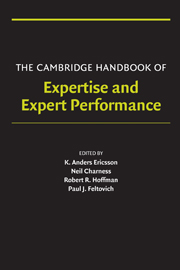Book contents
- Frontmatter
- Contents
- Acknowledgments
- Contributors
- PART I INTRODUCTION AND PERSPECTIVE
- 1 An Introduction to The Cambridge Handbook of Expertise and Expert Performance: Its Development, Organization, and Content
- 2 Two Approaches to the Study of Experts' Characteristics
- 3 Expertise, Talent, and Social Encouragement
- PART II OVERVIEW OF APPROACHES TO THE STUDY OF EXPERTISE – BRIEF HISTORICAL ACCOUNTS OF THEORIES AND METHODS
- PART III METHODS FOR STUDYING THE STRUCTURE OF EXPERTISE
- PART IV METHODS FOR STUDYING THE ACQUISITION AND MAINTENANCE OF EXPERTISE
- PART V DOMAINS OF EXPERTISE
- PART VI GENERALIZABLE MECHANISMS MEDIATING EXPERTISE AND GENERAL ISSUES
- Author Index
- Subject Index
- References
2 - Two Approaches to the Study of Experts' Characteristics
from PART I - INTRODUCTION AND PERSPECTIVE
- Frontmatter
- Contents
- Acknowledgments
- Contributors
- PART I INTRODUCTION AND PERSPECTIVE
- 1 An Introduction to The Cambridge Handbook of Expertise and Expert Performance: Its Development, Organization, and Content
- 2 Two Approaches to the Study of Experts' Characteristics
- 3 Expertise, Talent, and Social Encouragement
- PART II OVERVIEW OF APPROACHES TO THE STUDY OF EXPERTISE – BRIEF HISTORICAL ACCOUNTS OF THEORIES AND METHODS
- PART III METHODS FOR STUDYING THE STRUCTURE OF EXPERTISE
- PART IV METHODS FOR STUDYING THE ACQUISITION AND MAINTENANCE OF EXPERTISE
- PART V DOMAINS OF EXPERTISE
- PART VI GENERALIZABLE MECHANISMS MEDIATING EXPERTISE AND GENERAL ISSUES
- Author Index
- Subject Index
- References
Summary
This chapter differentiates two approaches to the study of expertise, which I call the “absolute approach” and the “relative approach,” and what each approach implies for how expertise is assessed. It then summarizes the characteristic ways in which experts excel and the ways that they sometimes seem to fall short of common expectations.
Two Approaches to the Study of Expertise
The nature of expertise has been studied in two general ways. One way is to study truly exceptional people with the goal of understanding how they perform in their domain of expertise. I use the term domain loosely to refer to both informal domains, such as sewing and cooking, and formal domains, such as biology and chess. One could choose exceptional people on the basis of their well-established discoveries. For example, one could study how Maxwell constructed a quantitative field concept (Nersessian, 1992). Or one could choose contemporary scientists whose breakthroughs may still be debated, such as pathologist Warren and gastroenterologist Marshall's proposal that bacteria cause peptic ulcers (Chi & Hausmann, 2003; Thagard, 1998; also see the chapters by Wilding & Valentine, Chapter 31, Simonton, Chapter 18, and Weisberg, Chapter 42).
Several methods can be used to identify someone who is truly an exceptional expert. One method is retrospective. That is, by looking at how well an outcome or product is received, one can determine who is or is not an expert.
- Type
- Chapter
- Information
- Publisher: Cambridge University PressPrint publication year: 2006
References
- 290
- Cited by

